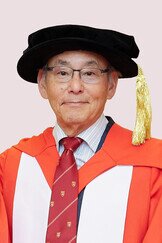

Mr Pro-Chancellor,
We gather here today to honour distinguished individuals who have bravely tackled the most pressing challenges of our time. Our first honorand, Professor Steven Chu, has led a remarkable career in scientific research, higher education, policy making, and social advocacy. He is a global leader and spokesperson on renewable energy and has for decades tirelessly argued that a shift away from fossil fuels is critical to combat global climate change. Today, as climate change is happening even more quickly than we had originally feared, Professor Chu’s messages remain poignant and ever more urgent.
With undergraduate degrees in mathematics and physics from the University of Rochester and a PhD in physics from the University of California, Berkeley, Professor Chu joined the Bell Labs in 1978. He then joined Stanford University in 1987, where he chaired the Physics Department from 1990 to 1993 and again from 1999 to 2001 and helped initiate the Bio-X institute to connect the physical and biological sciences with engineering and medicine.
In 1997, Professor Chu received the Nobel Prize in Physics for the “development of methods to cool and trap atoms with laser light,” a recognition he won together with Claude Cohen-Tannoudji and William Daniel Phillips. At Stanford, Professor Chu’s research also expanded into biological physics and polymer physics at the single-molecule level. In 2004, he joined UC Berkeley's Departments of Physics and Molecular and Cell Biology and was also appointed Director of the Lawrence Berkeley National Laboratory. Under Professor Chu’s stewardship, the Lawrence Berkeley Lab became a centre of research into biofuels and solar energy, cementing the Lab’s as well as Professor Chu’s reputation as a global leader in renewable and sustainable energy. Professor Chu is currently William R. Kenan Jr. Professor of Physics, and Professor of Molecular and Cellular Physiology, and Professor of Energy Science and Engineering at Stanford University. He runs an active research program that develops and applies new approaches for molecular biology, medical imaging, batteries and carbon capture.
Professor Chu has served as President of the American Association for the Advancement of Science, and was Senior Advisor to the Directors of the National Institutes of Health and the National Nuclear Security Agency. He holds 35 honorary degrees, and is a member of the US National Academy of Sciences, the American Philosophical Society, American Academy of Arts and Sciences, and many international academies, including inter alia, the Royal Society, the Royal Academy of Engineering, the Academia Sinica, the Korean Academy of Sciences and Technology, the Chinese Academy of Sciences and the Pontifical Academy of Sciences at the Vatican.
In my communication with Professor Chu, I asked what he would like his legacy to be. He said: “Science is a cumulative enterprise that builds collective wisdom, so it is not important that we be remembered for our individual contributions.” But if remembered, he hopes it would be as someone who not only generated paradigm-shifting scientific discoveries, but also sought meaningful ways to “accelerate the transition from science discovery to societal service.” This is consistent with his remarks at the 2018 Nobel Week Dialogue on the topic “Water Matters.” When asked whether it was important to do work that would have societal impact, he said: “As a citizen I hope that all people, whether they are scientists or not, would think about what is happening in the world around them.”
This deep awareness of science’s societal impact and the penchant to translate scientific knowledge into positive social changes found their most powerful expression in Professor Chu’s role as the Secretary of Energy from 2009-2013 at the Obama White House. Professor Chu was the first Nobel Laureate and the first scientist to hold a US Cabinet position. He and Gary Locke, the former Secretary of Commerce, were also the first Chinese-Americans to have held Cabinet positions. As Secretary of Energy, Professor Chu vigorously pursued an increase of investment in clean energy, tirelessly fought to reduce our dependence on fossil fuels, and persistently tackled the global climate crisis on the world stage. Also in that position, he helped identify and recruit a cohort of outstanding scientists and engineers into the US Department of Energy.
In Asian-American communities, Professor Chu’s success stories became a beacon of hope, and an inspiration to generations of young Asian-American scholars and scientists. He has helped raise the social and political awareness of many in our generation as well as in our children’s generation and motivated many to break the bamboo ceilings in a variety of fields.
I asked Professor Chu whether he could name any setback in his spectacular career. He noted: “The full scope of climate change risks and an appreciation of the time it will take to make the transition to zero GHG emissions is not grasped by most people. As a result, the sense of urgency is not where it should be.” He stated this in a rather calm and matter-of-fact tone, but there was clearly frustration. When irreversible climate change and environmental degradation are met with insufficient sense of urgency, one cannot help oscillating between hope and despair. Professor Chu called himself “both an optimist and a pessimist.” As an optimist he continues to seek solutions, but the pessimist in him knows we are running out of time. Nonetheless, Professor Chu has this to offer to HKU students: “When you are old and grey, and look back on your life, you will want to be proud of what you have done. The source of that pride won’t be the things you have acquired or the recognition you have received. It will be the lives you have touched and the difference you have made to make the world a better place.”
Mr Pro-Chancellor, it is my great honour and tremendous privilege to present to you Professor Steven Chu, for the award of Doctor of Science honoris causa.
Citation written and delivered by Professor Nicole Huang, Public Orator, the University of Hong Kong.



